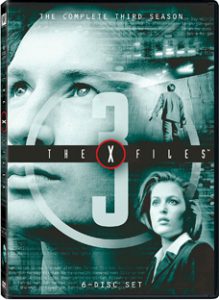Season 3 was when “The X-Files” became the show that I now picture in my head when I fondly daydream about “The X-Files.” Gone for the most part are the endearingly clunky episodes where the writers and directors were finding their footing; in Season 3 (1995-96, Fox), the show became a well-oiled machine.
Cutting to the chase
In the first stand-alone of the season, for example, Mulder and Scully are immediately on the case of a lightning boy in Oklahoma; we skip the part where Mulder has a slideshow in the office and they drive a rental car along back roads.
And although I prefer earlier mythology episodes, Season 3 was when Chris Carter and Frank Spotnitz found their recipe for longevity, if not a satisfying big picture — keep adding to the pot (a tape proving the government’s awareness of aliens, experiments on humans with alien DNA, alien black oil that can control humans, and an internal war among the shapeshifting aliens). Add ingredients, stir, simmer; but don’t bring to a boil, at least not for a few more years.

“The X-Files” Season 3 (1995-96)
Fox, 24 episodes
Showrunner: Chris Carter
Starring: David Duchovny, Gillian Anderson, Mitch Pileggi
Mulder had always been Mulder, the guy who wants to believe. But where did Scully fit into that? In Season 3, it became clear that she would always be at Mulder’s side — this is especially clear in “War of the Coprophages,” where she’s dozing with the phone by her side, waiting for Mulder’s next update on his investigation, and “Quagmire,” where she accompanies Mulder on a hurry-up-and-pack weekend case that probably could’ve been handled by regular law enforcement.
Gaining some clarity
Season 3 was when Mulder and Scully’s love for each other became clear (at least on my chronological viewing of the DVD; I admit that I wasn’t aware of it back when I watched random reruns). It also became clear that Skinner was a trusted ally, that X’s inside source was the Cigarette Smoking Man himself, and that Krycek was an intriguing wild card.
“The X-Files’ ” third season also tread outside the box in three notable cases: The Darin Morgan episodes (his only three episodes after Season 2’s “Humbug”) that put a humorous, satirical bent on the show’s touchstones. Upon rewatching these eps, I found that I like “Clyde Bruckman’s Final Repose,” I love “War of the Coprophages” and I appreciate “Jose Chung’s From Outer Space.”
Still, I’m a monster-of-the-week guy, and it’s those episodes that make this the show’s most consistently good season (and besides, without “normal” episodes, there would be nothing for Morgan to comment on).
It was harder for me to rank Season 3’s episodes compared to the first two seasons, which actually had bad episodes that I could easily relegate to the bottom, but here goes:
1. “Quagmire” (22, written by Kim Newton)
It’s arguably the greatest Mulder-Scully non-romance romance story, starting with how she accompanies him on this wild goose chase, even bringing her (doomed) dog Queequeg along due to the late notice. It has great natural scenery of the Georgia forest and lake (and for once, Vancouver stands in for the South effectively), and it’s highlighted by the famous long dialogue where M&S get to know each other as they’re stranded on a rock in the middle of the lake. The final shot of Big Blue, which confirms that Mulder isn’t crazy to believe after all, puts a tidy bow on the whole package.

2. “Grotesque” (14, Howard Gordon)
You hear a lot about John Bartley’s ability to light the dark and Mark Snow’s knack for setting just the right mood through music, and the skills of both are on vibrant display here. Also, David Duchovny gets to (somewhat controversially) take Mulder to the dark side as he obsessively molds gargoyles in a dead man’s apartment.
3. “War of the Coprophages” (12, Darin Morgan)
In the most underrated of Morgan’s four scripts, the cleverly satirical takes on Mulder (distracted by an attractive cockroach researcher named Bambi) and Scully (leaping at the phone every time it rings) are amusing for fans. Oddly, I also remember liking this episode before I knew it was a satire.
4. “Oubliette” (8, Charles Grant Craig)
I’ve always loved this episode, and I was pleased to find it held up on this viewing. For one, there’s an early appearance by Jewel Staite of “Higher Ground” and “Firefly,” but the main appeal is Tracy Ellis’s portrayal of an empathic former kidnap victim, along with the way Mulder connects to her.
5. “Syzygy” (13, Chris Carter)
This is another one I loved as a kid; whenever an “X-Files” case took place in a high school, I ate it up. Because the story involves people being controlled by a rare alignment of planets, it allows for Mulder and Scully to act amusingly brash toward each other (“I was just never sure your little feet could reach the pedals,” Mulder tells Scully, explaining why he always drives).
6. “Paper Clip” (2, Carter)
This is a great mythology episode where it truly looks like the CSM and his cronies are going to bury our heroes and the X-Files for good. But then Skinner turns the tables by sharing the contents of the digital tape with an entire nation of Native Americans, memorably telling the CSM, “This is where you pucker up and kiss my a**.”
7. “Wetwired” (23, Mat Beck)
Duchovny got a chance to act outside the box in “Grotesque,” and now Gillian Anderson gets her turn as Scully is influenced by subliminal TV messages. Her attempt to kill Mulder is especially effective since we’ve seen how close they’ve grown all season (even if they aren’t aware of it themselves). We also see here that, contrary to popular perception, “The X-Files” is just as much Scully’s quest as it is Mulder’s: She’s terrified by the notion that he is part of the conspiracy and she’ll have to go it alone.
8. “Avatar” (21, David Duchovny and Gordon)
Skinner takes center stage in this episode that’s structured like one of those twisty conspiracy crime movies. Here, it becomes clear that Mitch Pileggi could step up and become a regular if the show ever asked him to.
9. “Hell Money” (19, Jeffrey Vlaming)
This underrated ep has a great sense of place as it delves into San Francisco’s Chinatown and chronicles a disturbing underground lottery where desperate immigrants put their body parts up for drawing.
10. “Clyde Bruckman’s Final Repose” (4, Morgan)
Peter Boyle’s performance as a depressed psychic who knows how everyone will die adds a lot of heart to this otherwise whimsical hour.
11. “Revelations” (11, Newton)
This episode about a boy showing signs of stigmata pulls off a neat trick of flipping the script. By emphasizing Scully’s religious upbringing (which she is slightly uncomfortable about) and Mulder’s devout atheism (which he is slightly arrogant about), Scully becomes the believer and Mulder the skeptic.
12. “Jose Chung’s From Outer Space” (20, Morgan)
I used to hate this episode, but I enjoyed it on this viewing and learned to appreciate it more by reading the Onion AV Club’s glowing write-up. I’m glad that not every episode is this self-reflexive and silly, but it’s OK to do it once.
13 and 14. “Nisei” (9, Carter, Gordon and Frank Spotnitz) and “731” (10, Spotnitz)
The government baddies are at their most nefarious here, experimenting on humans using alien DNA and then discarding the corpses. This two-parter is memorable for Mulder’s standoff with the CIA agent on the train car, which contains a caged hybrid and a bomb. And like the Season 2 finale “Anasazi,” it’s a great example of Scully’s level-headed protectiveness of her almost off-the-rails partner.
15 and 16. “Piper Maru” (15, Carter and Spotnitz) and “Apocrypha” (16, Spotnitz and Carter)
With these famous black oil episodes, it’s best to watch them as a self-contained story and not think about the big picture. This is the point in the mythology timeline when it becomes obvious that the story is only going to get more convoluted; still, the episodes themselves can be fun to watch.
17. “Talitha Cumi” (24, Duchovny and Carter)
It’s not an awful season finale, ending with the shot of the shapeshifting bounty hunter — who is like this show’s Terminator — closing in on Mulder, Scully and the good alien healer who could be the father of Max from “Roswell.” But it’s also a launching pad for many more seasons of the mythology beating around the bush rather than giving us answers, so in that sense it’s a missed opportunity to have an amazing finale to an amazing season.
18. “Teso Dos Bichos” (18, John Shiban)
This “killer pussycats” episode is probably the most reviled of Season 3, with critics calling it a throwback to the clunkier first season. But it’s not as bad as its reputation, and it has one of the series’ great gross-outs: The toilets filled with rats trying to escape the sewers.
19. “2Shy” (6, Vlaming)
Revisiting the Tooms template, we get a killer who is driven by a genetic need; he needs fat, whereas Tooms needed livers. In 1995, it was cutting-edge to explore the dangers of meeting people online, but it holds up today.
20. “D.P.O.” (3, Gordon)
This is the first of the new breed of polished, efficient MOTWs, with memorable performances by Giovanni Ribisi as Lightning Boy and Jack Black as his buddy.
21. “Pusher” (17, Vince Gilligan)
This is a classic episode (which would get a sequel later) about a guy who can get people to do his bidding just by telling them to. It doesn’t work as well for me as it does for other fans, perhaps because the killer seems like such a slimeball, unlike, for example, the slightly sympathetic killer from Season 2’s “Irresistible.”
22. “The Blessing Way” (1, Carter)
The season gets off to a slow and mystical start as Mulder — recovering from smoke inhalation and desert exposure in a Native American healing tent — sees visions of Deep Throat and his dad reminding him to trust no one and that the truth is out there.
23. “The Walk” (7, Shiban)
I always wondered if that actor actually was a quadruple amputee (eventually I read that he is not, making me appreciate the camera trickery). This ep is a worthy commentary on soldiers feeling abandoned by their country, but it’s a bit heavy handed.
24. “The List” (5, Carter)
There’s not a lot of suspense here. We know that the executed convict is killing from beyond the grave, and we know that the warden is corrupt (probably because he’s played by J.T. Walsh).
What are your favorite episodes from Season 3 of “The X-Files?” Share your thoughts in the comment thread below.
P.S. One of my favorite memories of Thanksgiving in the pre-DVD, pre-Netflix days was when FX would show all-day “X-Files” marathons. They were fan-picked episodes, so I sat there enjoying but not fully understanding the mythology episodes. I thought “This seems somewhat interesting. Someday I’ll watch them in order, from the beginning, so I can know what’s going on.” And now I’m finally doing that (watching them in order, not necessarily understanding what’s going on).

